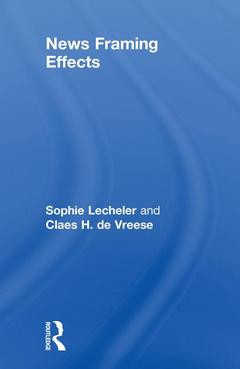News Framing Effects
Auteurs : Lecheler Sophie, de Vreese Claes H.

News Framing Effects is a guide to framing effects theory, one of the most prominent theories in media and communication science. Rooted in both psychology and sociology, framing effects theory describes the ability of news media to influence people?s attitudes and behaviors by subtle changes to how they report on an issue. The book gives expert commentary on this complex theoretical notion alongside practical instruction on how to apply it to research.
The book?s structure mirrors the steps a scholar might take to design a framing study. The first chapter establishes a working definition of news framing effects theory. The following chapters focus on how to identify the independent variable (i.e., the "news frame") and the dependent variable (i.e., the "framing effect"). The book then considers the potential limits or enhancements of the proposed effects (i.e., the "moderators") and how framing effects might emerge (i.e., the "mediators"). Finally, it asks how strong these effects are likely to be. The final chapter considers news framing research in the light of a rapidly and fundamentally changing news and information market, in which technologies, platforms, and changing consumption patterns are forcing assumptions at the core of framing effects theory to be re-evaluated.
Chapter 1: News Framing Effects Theory: An Integrative View Chapter 2: News Framing Effects… From Where? Chapter 3: News Framing Effects… On What? Chapter 4: Moderators of News Framing Effects… On Whom? Chapter 5: Mediators of News Framing Effects… How and Why? Chapter 6: The Duration of News Framing Effects… How Long? Chapter 7: The Future of News Framing Effects… And Now?
Sophie Lecheler is Professor of Political Communication at the University of Vienna, Austria. Her research interests include news framing research, experimental methods, journalism, and emotions. Her research has appeared in various international journals, such as Journal of Communication, Communication Research, Political Communication, and Communication Theory.
Claes H. de Vreese is Professor and Chair of Political Communication at the Amsterdam School of Communication Research, University of Amsterdam, the Netherlands. His research interests include journalism, news effects, and public opinion. He has published more than 150 articles in international journals, and (co-)authored several books.
Date de parution : 08-2018
12.9x19.8 cm
Date de parution : 08-2018
12.9x19.8 cm
Disponible chez l'éditeur (délai d'approvisionnement : 14 jours).
Prix indicatif 35,19 €
Ajouter au panierThème de News Framing Effects :
Mots-clés :
News Framing Effects; News Frames; News framing; De Vreese; Framing Effects; News framing effects theory; Proposed Mediator Variable; Sophie Lecheler; News Frame Influences; Claes H; de Vreese; Frame Building Process; media effects; Framing Effects Research; political communication; Economic Consequences Frame; journalism and society; Journalistic Agency; media and society; Individual Level Moderator; mass communication theory; Issue Specific Frames; news framing study design; Framing Effect Studies; mediators; Emphasis Frames; Elite Framing; moderators; Media Effects Research; news media; Parallel Mediation Model; General Study Characteristics; Analyze Mediation Models; Information Ecology; Contextual Moderators; Conflict Frames; Journalism Research; Pre-treatment Exposure; Applicability Effect



